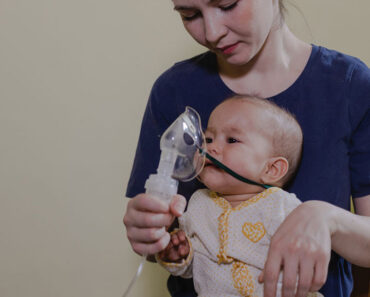image: Shutterstock
The American Academy of Pediatrics advocates that all babies should be exclusively breastfed up to six months of age and should continue to breastfeed along with an appropriate diet till two years of age (1). The World Health Organization (WHO) recommends breastfeeding from six months to the age of two years and beyond with an adequate complementary diet (2).
The process of stopping breastfeeding is known as weaning. Weaning is when babies begin to have food other than breast milk, stopping breast milk consumption eventually. This post tells you all that you need to know about weaning and how to stop breastfeeding.
When Is The Good Time To Stop Breastfeeding?
It is entirely up to the mother and the child when they want to stop breastfeeding. It is suggested to continue breastfeeding until the recommended age. But some factors might compel a mother to start weaning sooner. Do not compare your situation to that of other families or mothers. Weaning is a personal decision, and you know the best for your baby.
The Centers for Disease Control and Prevention recommends that if you decide to wean and your child is younger than 12 months, you must provide the child with formula milk. If you wean your baby after 12 months, they must be given fortified cow’s milk (3).
Factors That Influence Mothers To Quit Breastfeeding
Breastfeeding can be tiring and overwhelming at times. The following reasons may make a mother consider quitting breastfeeding.
1. Inadequate milk production
It is not possible for a mother to gauge the amount of breast milk that the baby consumes when feeding directly from the breast. Most mothers think they have an inadequate milk supply and may offer a bottle of formula after a breastfeeding session. The baby would suck at the nipple due to the sucking reflex, making the mother believe she has a low milk supply.
2. Discontented baby
Some mothers think that because the baby is sucking on the bottle rapidly, the baby is not content. They keep on sucking on the bottle because of the sucking reflex. This concern could drive some mothers to stop breastfeeding prematurely. A study among 1323 mothers showed that 43.5% of women believed that breast milk did not satisfy their baby (4).
3. No interest in breast milk
Some mothers believe that the baby has lost interest in breastfeeding. However, babies might get more playful and mobile as they grow in age and gain strength. They might show restlessness in being in the same position while breastfeeding. Feeding in a dark and quiet environment could help in such cases.
4. Increased nutritional requirements
For some babies, breast milk might not be enough to satisfy their calorie needs. If the doctor recommends switching to formula or solids, you may continue to give breast milk along with complementary food instead of stopping breastfeeding.
5. Mother’s health condition
There could be instances where the mother is physically or emotionally unwell, making it difficult for her to breastfeed. Feeding formula could be an alternative in such cases.
6. Work commitments
Some women have to join work after delivery. The job profile or circumstances might not be feasible for them to continue their breastfeeding journey, and they may quit breastfeeding the baby.
7. Baby bites
Some babies do not latch well and might keep biting the mother’s nipples. This might lead to sore, cracked, bleeding nipples. It causes severe pain in mothers and may also cause infection. This might compel some mothers to stop breastfeeding completely.
At times, mothers have to abruptly stop breastfeeding the infant. The following are some scenarios where mothers may abruptly stop breastfeeding.
8. A new medication
Certain drugs are contraindicated in breastfeeding. If your doctor prescribes these drugs for you, then you might have to stop breastfeeding abruptly. For example, drugs used in chemotherapy for cancer treatment might be harmful to the baby. You may discuss with your healthcare provider if there are any breastfeeding-friendly drugs available.
9. Separation from child
Certain professional commitments, such as military deployment, may separate you from your child. While you can pump and send breast milk to your baby, many mothers may not be able to do it due to time constraints.
10. Peer pressure
Some mothers prefer to let the baby decide when they want to wean off breast milk. However, other people, partners, or families may not be supportive enough and criticize her choice of continuing breastfeeding, especially if the child is a little older. This may make the mother stop breastfeeding abruptly.
11. A new pregnancy
A new pregnancy does not always demand a cessation of breastfeeding. But, hormonal changes during breastfeeding can cause uterine contractions, increasing the risk of premature delivery (5). Your healthcare provider might suggest you wean the baby abruptly in such scenarios.
How To Stop Breastfeeding A Baby Gradually?
It is suggested to wean the baby gradually. Breast milk production depends on the demand (6). Gradual weaning will reduce breast milk production gradually and also give adequate time for the baby to transition. The following suggestions may help you wean your baby gradually.
- You may substitute breast milk with iron-fortified formula milk if the baby is younger than 12 months.
- Sometimes, a baby may demand comfort nursing to be close with the mother. In such cases, cuddle with the baby without breastfeeding. You may also engage them in activities, such as reading, when they demand comfort nursing.
- Pick the feed that is not very important and drop it from the breastfeeding schedule. Usually, the first and the last feed are more important for the babies. You may begin by dropping a mid-day feed. You may also consider offering formula or cow milk (if the baby is older than 12 months) during the time of the dropped feed.
- You may continue dropping feeds at a gap of two to five days. Check the baby’s reaction. If the baby seems to have trouble adjusting, you may increase the gap.
- You may try changing their schedules. For example, if the baby has a habit of breastfeeding immediately after coming home from daycare, take them to a supermarket instead of directly returning home.
- Offer them a healthy snack or water a few minutes before their normal feed time.
- You may also try making the feeding sessions shorter. Instead of unlatching them forcefully, say a story or sing a song to distract them playfully.
- Night-time feeds are usually the most comforting and important for babies. You may stop breastfeeding at night once other feeds are dropped.
- If the toddler is old enough, you can explain the need for weaning. You may set a deadline that they won’t feed after a mutually decided date.
- You may occasionally use a pacifier to comfort your baby, as sucking makes them relaxed. Do not dip pacifiers in sugar to avoid dental decay.
Can You Stop Breastfeeding Abruptly?
While gradual weaning is more comfortable for both the mother and the baby, it is possible to stop breastfeeding abruptly. Mothers might need to stop breastfeeding abruptly due to reasons beyond their control, such as health problems or professional commitments. If you have to wean your baby abruptly, the following suggestions may help you avoid having engorged breasts.
- Wear a well-supportive bra
- Reduce salt intake
- Do not restrict fluid intake
- Express just the right amount of milk to relieve discomfort. Gradually your body will begin to produce less milk.
If you stop breastfeeding abruptly, the following tips may help your baby be healthy and comfortable.
- If possible, do not wean them abruptly when they are not in their best state. For example, weaning while they are sick, teething, or amidst a growth spurt might make the process more difficult.
- You may ask the baby’s father or another caregiver to feed the baby using a bottle or spout cup.
- Have someone else attend to the baby when they wake up at night.
- You may try changing your routine. For instance, step out with the baby when it is the usual breastfeeding time.
- Contact the baby’s doctor to ask what food substitutes you should use to replace the mother’s milk.
- Many mothers feel the need to distance themselves from the baby, fearing that the baby would insist on nursing. But this transition is difficult for babies. They do not breastfeed for hunger alone but also associate it with love. They need some tender loving care when weaning. Hug and cuddle them to provide the reassurance that they are still loved (7).
Side Effects Of Abruptly Stopping Breastfeeding
A mother may see the following side effects when breastfeeding is stopped abruptly (8).
- Leaking breasts
- Swollen breasts
- Mood swings
- Engorged painful breasts
- Clogged ducts
- Mastitis
- Mild fever or flu-like symptoms
What If Your Baby Still Demands Breast Milk?
Weaning is a gradual process, and your baby may continue to demand breast milk. You may try one or more of the following measures to deal with the situation.
1. Changing their formula or solids: Just like adults, even babies might have taste preferences. Try and change the brand of their formula or try to offer them a variety of solids. If they are hungry, they may begin to prefer a solid food item, which they like more than breast milk.
2. Changing your approach: You may offer formula or milk in the bottle during lunchtime today and dinner time tomorrow to bring some variety. You may try different recipes to make their meals interesting.
3. Seeking help: Babies usually associate mothers with breastfeeding. They might get crankier when they want to breastfeed and see you around. You may ask your partner or a family member to feed them formula or solids to make them associate food with another person.
4. Maintaining consistency: Consistency is the key to wean the baby. Follow a routine for breastfeeding and supplemental feeding. There might be times when the baby is very cranky and demands breastfeed. By maintaining composure, you can make the process easier.
What Happens When You Stop Breastfeeding?
You may experience several changes in your body when you stop breastfeeding.
- After stopping breastfeeding, oxytocin and prolactin begin to drop substantially. This hormonal imbalance may cause mood swings, depression, and anxiety (9).
- It takes some time for the body to reduce milk production after weaning. You may experience painful breasts due to excess milk accumulation.
- Some women do not get their periods during the breastfeeding phase. It is known as lactational amenorrhea. Once you stop breastfeeding, you might find your menstruation resuming (10).
- The increased appetite during breastfeeding may continue even after you stop breastfeeding. It may lead to a caloric surplus, resulting in weight gain.
How Long Does It Take For Milk To Dry Up?
Every woman takes a different duration to dry up. Once you stop breastfeeding, the feeling of fullness lingers for a few days. It might be a difficult and inconvenient time for mothers. After the feeling of fullness is gone, you may continue to produce small amounts of milk for months or even years at times. However, if this milk production and leakage continue for very long, it could suggest hormonal imbalance and require medical attention (8).
Frequently Asked Questions
1. Can I resume breastfeeding after weaning?
Starting breastfeeding after a gap is possible in some cases. It is easier if you have stopped breastfeeding just a few weeks ago. However, everybody reacts differently. Sincere pumping of milk via hand or a breast pump can help one kickstart milk production. A lactation consultant may help you with some medicines and detailed guidance to resume breastfeeding. If you have to wean your child only temporarily, for example, when sick or traveling, it is better to keep pumping so that your milk production does not halt.
2. How long can an infant take to stop breastfeeding?
Each baby takes a different time to wean off breastfeeding. It depends on several factors, such as the age of the baby, the baby’s breastfeeding schedule, family support, and whether the baby can adopt a solid food diet quickly.
Breastfeeding is vital for the baby, but there comes a time that you may have to stop it. It is essential to be consistent with your efforts, which should be conducted gradually. Take cues from the baby’s reaction and make changes to your steps accordingly. When in doubt, do not hesitate to take the opinion of your doctor or a certified lactation consultant.





![Manage Difficult Behaviors With Three Magic Words [Parenting Tips] Manage Difficult Behaviors With Three Magic Words [Parenting Tips]](https://usparenting.com/wp-content/uploads/2020/11/1605425971_hqdefault-370x297.jpg)




























